 Glen Daniel Juvenile Law Lawyers, West Virginia
Glen Daniel Juvenile Law Lawyers, West Virginia
Sponsored Law Firm
-
 x
x

Click For More Info:
-
The Law Offices of Claude S. Smith III
805 Bigley Avenue Charleston, WV 25302» view mapCriminal Defense Law Working With Clients One On One
As your attorney, I will make sure you know that I am here for you. I will keep you updated on your case as it progresses.
800-936-8471
Not enough matches for Glen Daniel Juvenile Law lawyer.
Below are all Glen Daniel Criminal lawyers.
Sponsored Lawyers
1-4 of 4 matches
Accident & Injury, Criminal, Bankruptcy & Debt, Family Law, Trusts
Ron has, over the last decade, assisted clients by planning and designing settlements to address future needs and ensure any government benefits are protected. He has been involved in settlements involving personal injury, workers’ compensation, and employment-related claims. Ron’s consulting and legal services also include providing economic expert witness work, reducing future claimed damages to present value, and advising on work-life expectancy. Our firm brings a unique perspective and approach to law: after more than a decade of advising clients on financial matters, we decided our firm would focus on areas of financial law. This is why bankruptcy, trusts, and tax law are our major focus areas. Of course, we are happy to discuss and assist you with all your legal needs. We aim to be accessible and able to provide personal attention to every client we work with.
(more)Accident & Injury, Personal Injury, Divorce & Family Law, Criminal
Whether you have suffered an accident while on the job or suffered an injury during a car accident or semi truck accident, The Law Offices of Claude S. Smith III devote personal attention to your case. Our attorney and legal staff understand the pressure and emotional stress experienced by those involved in legal cases. We strive to bring personalized attention and care to every single client.
(more)


 Claude S. Smith, III Charleston, WV
Claude S. Smith, III Charleston, WV Practice AreasExpertise
Practice AreasExpertise


